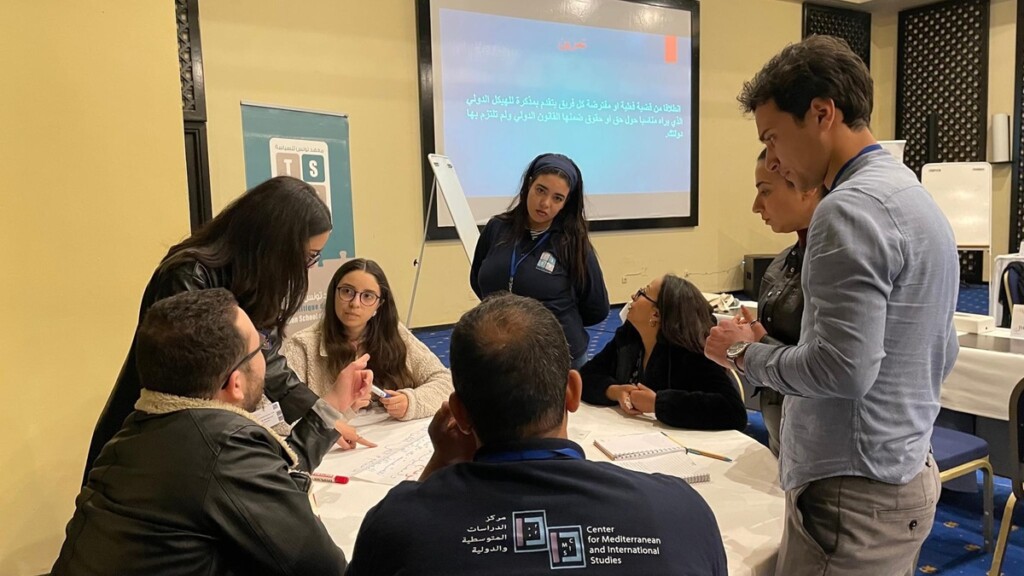
Demo Finland in Tunisia
The co-operation started in 2012.
Partners: Centre des Etudes Méditerranéennes et Internationales (CEMI) and Netherlands Institute for Multiparty Democracy (NIMD)
Demo Finland supports the Tunisia School of Politics (TSoP), which brings together the younger generation of politicians from political parties and NGOs in training programmes, providing them with both knowledge and practical tools for political influence. TSoP organises multi-party debates and open dialogues between political parties, civil society and other social actors. The programme also strengthens the skills and understanding of politics among young people who are not active in political parties or NGOs. In addition to Tunisia, the programme also operates regionally, training young people from North Africa, the Middle East and French-speaking Africa.
In the current difficult political climate of Tunisia, the TSoP creates space for dialogue and co-operation between actors representing different political positions and supports young people and their organisations to engage in democratic development.
Results of our work
- Since 2012, the Tunisian School of Politics (TSoP), established with the support of Demo Finland, has trained more than 900 young politicians in the basics of multi-party democracy. In addition to the training programme, hundreds of people have participated in other TSoP activities each year, such as trainings of trainers and alumni activities.
- TSoP alumni have proceeded to more prominent positions in their respective parties and organisations. In addition, alumni have trained their colleagues and other actors at the national and international levels in topics discussed in the TSoP.
- Through the programme, several hundred political and civil society actors engage in dialogue every year. In 2024, a total of 212 participants took part in nine multi-party or multi-stakeholder dialogue events.
- The TSoP and the high-level multi-party dialogue forum, active earlier in the programme, have both increased trust and co-operation between participants and generated policy initiatives. For example, in 2019, 13 parties signed a joint statement on ethical election campaigning.
Background on Tunisia
Tunisia is the only Arab country to become a democracy after the 2011 uprisings (the Arab Spring). However, President Kais Saied, elected in 2019, dismissed the Prime Minister and suspended the Parliament in July 2021. The country has slid towards authoritarianism as the President has concentrated power in himself. The independence of the judiciary and electoral authorities has been significantly weakened, including through amendments to the Constitution. Opposition to the President is silenced, for example, by the imprisonment of political opposition, civil society actors and media representatives on charges such as conspiracy against the state.
The weak state of democracy and the rule of law has undermined public confidence in political decision-making, with a turnout of only around 11% in the 2022–2023 parliamentary elections and 28.8% in the 2024 presidential elections. Around half of the Tunisian population is under 30 years of age, and confidence in the political system is particularly low among youth: the turnout for the presidential elections was only 6% for 18–35-year-olds. Young people’s prospects are also clouded by very high unemployment and high inflation.
- Ranked 106/179 in V-Dem’s Liberal Democracy Index.
- Classified as an electoral autocracy* by V-Dem.
- Latest parliamentary election: 2022–2023.
- Women in parliament: the Assembly of the Representatives of the People 16%, the National Council of Regions and Districts 13%.
- The UN Covenant on Civil and Political Rights was ratified in 1969.
- The UN Convention on the Rights of Women was ratified in 1985.
- The UN Convention on the Rights of Persons with Disabilities was ratified in 2008.
- More information on the state of democracy in Tunisia: https://www.idea.int/democracytracker/country/tunisia
